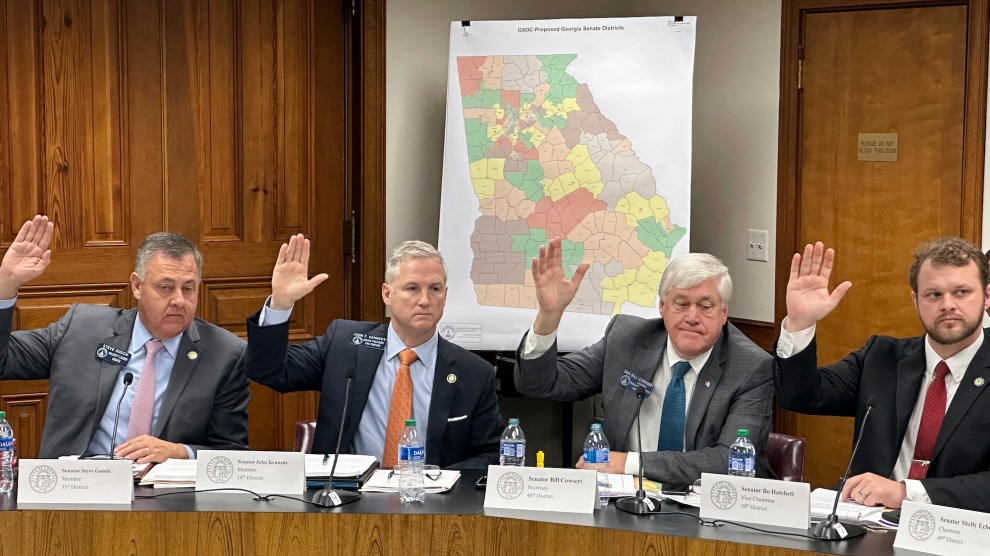
Four Republican Georgia state senators vote in favor of their party's plan to draw new voting districts, Nov. 30, 2023, at the Georgia Capitol in Atlanta. Jeff Amy/AP
In late October, a federal court ruled that Georgia’s electoral maps violated the Voting Rights Act by discriminating against Black voters. US District Court Judge Steve Jones ordered the state’s GOP-controlled legislature to draw new congressional and state legislative maps that would result in new majority-Black districts.
But instead of boosting Black representation, Republicans released a new congressional map on Friday that targets the district of Democratic Rep. Lucy McBath, one of two Black women representing Georgia in the US House. The map defies Jones’ order, voting rights groups say, and preserves the GOP’s 9 to 5 advantage in the House by diluting Black representation.
McBath, an outspoken advocate of gun control measures whose teenage son was fatally shot by a white man in 2012, called it a “blatant attempt to make me lose my seat.”
Under the GOP map, her diverse metro Atlanta district, where communities of color form a majority, would be transformed into a heavily white and pro-Republican district that stretches into the conservative exurbs and countryside north of Atlanta. The Black population would fall from 30 percent to just nine percent.
This is the second time in two years that Republicans have tried to dismantle McBath’s seat. In 2021, they redrew her suburban district, which was previously represented by Newt Gingrich but had trended blue, into a much redder and more rural seat. She ran for another metro Atlanta district, defeating fellow Democrat Carolyn Bourdeaux in a 2022 primary and winning re-election to the House. Now Republicans are trying to oust her again.
Republicans claim they’re not defying the court’s order because they created a new majority-Black district in metro Atlanta that is currently represented by Republican Rich McCormick. But the overall number of majority-minority congressional districts remains unchanged, and Jones specifically warned the legislature not to create minority representation in one district by diluting it in another. “The state cannot remedy [Voting Rights Act] violations described herein by eliminating minority opportunity districts elsewhere in the plans,” Jones wrote.
The Republican state leaders appear to be following the nullification strategy recently employed by Alabama Republicans. In June, the Supreme Court, in a surprise victory for voting rights, ordered the Alabama legislature to create a second majority-Black congressional district. They refused, and a federal court ultimately stepped in and authorized a special master to draw a new district that will allow Black voters to elect their preferred candidate.
Georgia Republicans may ultimately face the same fate, but they seem to be hoping that recent appellate decisions weakening the Voting Rights Act will allow them to continue diluting the voting power of Black Georgians.
The new congressional map is expected to be approved early next week, with litigation to quickly follow.
Black voters don’t fare much better under the state legislative maps adopted on Friday. Jones identified 10 state senate districts where Black representation was diluted, but the legislature only created two new majority-Black districts—not in the areas the judge specified—and preserved the GOP’s 33 to 22 seat advantage in the chamber.
The new Georgia House maps protect every Republican incumbent but two, even though all of the state’s demographic changes over the past decade came from communities of color. Historically, those communities have strongly favored Democratic candidates. The new maps include three districts where incumbent Democrats have to face off against one another, compared to only one such pairing for Republicans—thereby likely reducing Democratic representation.
“Anti-voter lawmakers in the state legislature are attempting to silence the voices of Black and brown voters in an effort to cling onto power,” said Nicole Robinson, political director of Fair Fight Action, the voting rights group founded by Democrat Stacey Abrams. “This is a pattern in Georgia.”
















